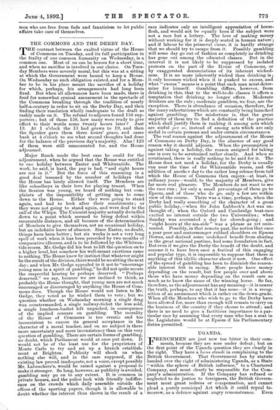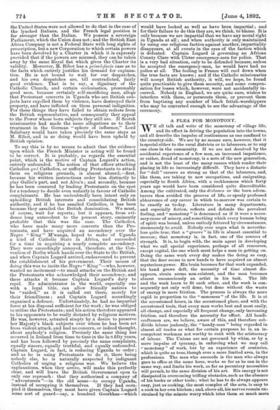UGANDA. F RENCHMEN are just now too bitter in their com-
ments, because they are sore under defeat ; but on the first point of the Uganda question they are clearly in the right. They have a locus standi in complaining to the British Government. That Government has by statute handed over the right of administering Uganda, as a State "within the sphere of British influence," to a Chartered Company, and must clearly be responsible for the Com- pany's administration. If the Company has refused or neglected to do justice to foreigners, the British Govern- ment must grant redress or compensation, and cannot plead a purely municipal Act which it could repeal to- morrow, as a defence against angry remonstrance. Even the United States were not allowed to do that in the case of the lynched Italians, and the French legal position is far stronger than the Italian. We possess a sovereign Parliament, which the Union does not ; and the British East Africa Company is not a Federal State with long rights of prescription, but a new Corporation to which certain powers have been devolved by a Charter in which it is expressly provided that if the powers are misused, they can be taken away by the same Royal fiat which gives the Charter its validity. Moreover, M. Ribot has a prim4-facie ease as to the facts which entirely justifies his demand for explana- tion. He is not bound to wait for our despatches, and his own despatches are, till contradicted, fairly good evidence. That is to say, a dignitary of the Catholic Church, and certain ecclesiastics, presumably good men, because certainly self-sacrificing men, allege that Protestant converts in Uganda who are British sub- jects have expelled them by violence, have destroyed their property, and have inflicted on them personal indignities. For these things they have failed to obtain redress from the British representative, and consequently they appeal to the Power whose born subjects they still are. If Scotch missionaries had made the same allegations as to their treatment in the German "sphere of influence," Lord Salisbury would have taken precisely the same steps as M. Ribot, and in so doing would have been upheld by British opinion.
To say this is by no means to admit that the evidence upon which the French Minister is acting will be found to be correct. It is probably, as regards the essential point, which is the motive of Captain Lugard's action, entirely unfounded. The notion of that officer attacking Catholics qua' Catholics, or suffering Protestants to attack them on religious grounds, is almost absurd,—first, because his written instructions order him distinctly to play Gallio's part, and not Alva's ; and secondly, because he has been censured by leading Protestants on the spot for a tendency to decide even unfairly in favour of Catholic complainants. He has undoubtedly been intent only on upholding British interests and consolidating British authority, and if he has assailed Catholics, it has been because they assailed the British domination. We must, of course, wait for reports ; but it appears, from evi- dence long antecedent to the present story, eminently probable that this was the case. The Catholics, who have made many more converts than the Pro- testants, and have acquired an ascendency over the Negro " King " M'wanga, hoped to make of -Uganda a kind of Catholic State in Africa, and succeeded for a time in acquiring a nearly complete ascendency. They were exceedingly annoyed, therefore, at the Con- vention of Berlin which hands over the State to the British, and when Captain Lugard arrived, endeavoured to prevent the establishment of his government. Their means of doing this was to incite the Negro " King "—who, however, wanted no incitement—to small attacks on the British and the Protestants who acknowledged their ascendency, and these attacks it became Captain Lugard's duty to repel. No administrator in the world, especially one with a legal title, can allow friendly natives to be "raided," as it is called out there, merely for their friendliness ; and Captain Lugard accordingly organised a defence. Unfortunately, he had no impartial force at his disposal sufficient for the work; he was obliged to utilise the Protestants ; and his action therefore appeared to his opponents to be really dictated by religious motives. He was, however, actuated simply by a desire to preserve her Majesty's black subjects over whom he has been set from violent attack, and had no concern, or indeed thought, about anybody's religion. Precisely the same thing has occurred in Ireland from time to time in the last fifty years, and has been followed by precisely the same complaints, equally sincere, equally truthful, and equally unfounded. Captain Lugard, in fact, is reducing- Uganda to order ; and as he is using Protestants to do it, there being nobody else, he is naturally suspected by indignant Catholics of urging a religious war. We believe the explanations, when they arrive, will make this perfectly clear, and will leave the British Government open to only one reproach : that they authorised a company of "adventurers "—in the old sense—to occupy Uganda, instead of occupying it themselves. If they had occu- pied it themselves, they must have given Captain Lugard some sort of guard—say, a hundred Goorkhas—which would have looked as well as have been impartial ; and for their failure to do this they are, we think, to blame. It is only because we are impartial that we have any moral right in Uganda at all ; and when authority is only maintained by using one religious faction against another, impartiality disappears, at all events in the eyes of the faction which is defeated. Captain Lugard is governing an .African County Clare with Ulster emergency-men for police. That is a very bad situation, only to be defended because, unless he accepted the emergency-men, he would have had no police at all. The feeling in France will cool down when the true facts are known ; and if the Catholic missionaries will accept British authority, it will, we hope, be found quite practicable to give them security, and some compen- sation for losses which, however, were not accidentally in- curred. Nobody in England, we are quite sure, wishes to interfere with them, or persecute them, or prevent them from baptising any number of black fetish-worshippers who may be converted enough to see the advantage of the ceremony.



































 Previous page
Previous page